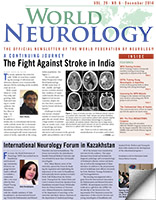
Donna Bergen
By Donna Bergen, MD
The Fogarty International Center (FIC), as part of the U.S. National Institutes of Health (NIH), supports global health research and research capacity building through its own programs and through partnerships with the rest of NIH and outside organizations. To meet its goal of improving global health through research, FIC strives to build partnerships between health research institutions and individual scientists in the U.S. and abroad, and to train young scientists.
Fogarty and 17 other NIH components sponsor a Global Health Program for Fellows and Scholars, which offers an opportunity for young investigators from the U.S. and from low- and middle-income countries (as defined by the World Bank) to learn new research skills, build collaborations and advance their careers. Applicants apply directly to specific “support centers,” which are U.S. academic institutions with special expertise in global health, and which are funded through competitive grants.
These support centers are the University of California at Berkeley, the University of California Global Health Institute, the University of North Carolina at Chapel Hill, the University of Washington and Vanderbilt University. Applications for FIC training grants are awarded through these support centers. These support centers identify and select candidates, and provide mentoring, technical and administrative assistance to the fellows and scholars in their year abroad.
The $20 million project is funded by the National Institutes of Health, with the goal of granting 400 health scientists on year-long research fellowships at 27 low- and middle-income country sites. The goal is to build consortia that will develop and support global health research training programs, which will provide intensive mentoring for participants and diverse clinical research experience in many sites. Some Fellows are trained in their own countries, with close mentoring from collaborating colleagues at other centers; others work directly through one of the support centers with one of the many other institutions that contribute to this project, enabling both U.S. and low- and middle-income trainees to participate in the program
Training is focused on disorders with major impact in low income countries, and on the growing problem of non-communicable diseases in all countries. With neurological conditions making up more than 10 percent of the burden of death and disability worldwide, neurologists moving into a career in international health should find the program of great interest.
If you are interested in learning more about the Fogarty fellowship, here are two useful sites.
http://www.fic.nih.gov/Programs/pages/scholars-fellows-global-health.aspx
http://www.fic.nih.gov/Programs/Info/Pages/scholars-fellows-faqs.aspx.
